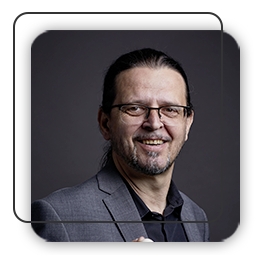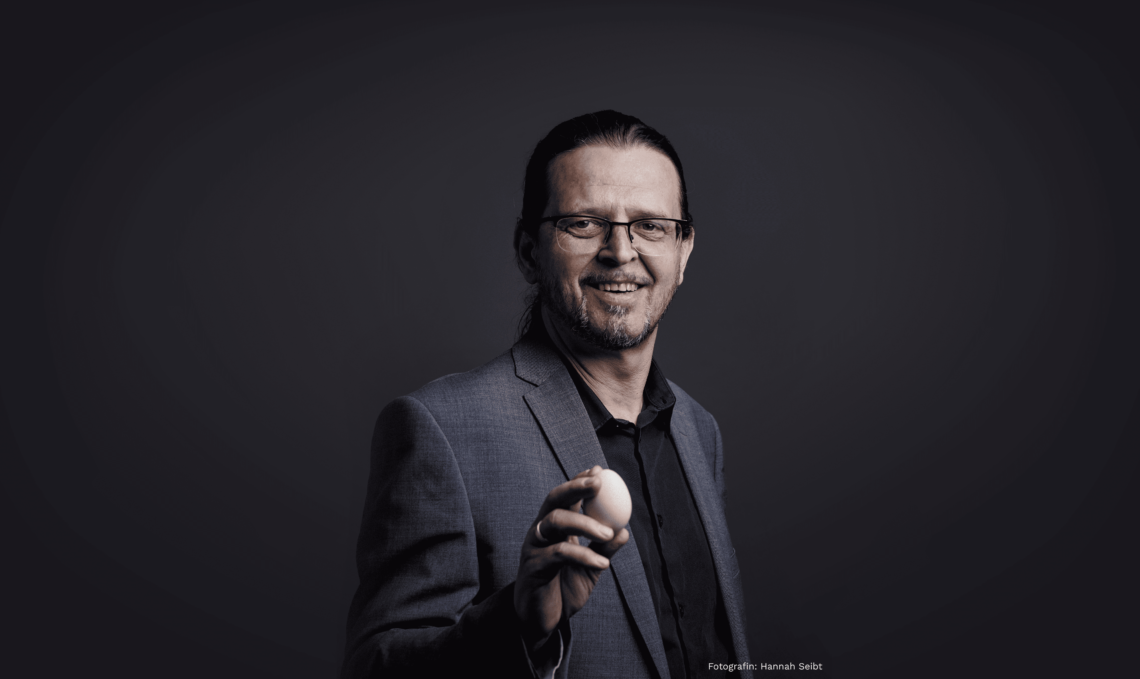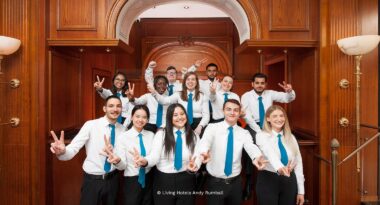Nowadays, even the best businesses in the restaurant and hospitality industry are up against shortage of personnel. For some of these businesses, this situation is existence-threatening, many of them are facing a decline in quality, uncertainties regarding planning as well as loss of innovation. When the number of applicants drops, and the quality of the applications reduces, you shouldn’t just get straight to business and act as before. Whereas years ago, annual staff turnover rates of 50% or more were considered as common in the industry, today companies aim for a rate of about 15%. Excellent team member retention generates less than 5%. But what to do if there isn’t any qualified personnel available?
In the service to the guest, the solution lies in convincing others of the appealing aspects of the job. This deeply held conviction of mine, moved me to found the Institute for Emotional Intelligence Management (Institut für emotionale intelligente Unternehmensführung; (www.ei-institut.at) together with the cooperation expert Martin Seibt in 2020. Nowadays it takes more than the mere allocation of tasks & responsibilities to create an environment filled with passion, meaningfulness and consequently added value for everyone. Relationship skills are needed as well. New Work is the sense of being with the right person at the right time. Executives are now asked to put emotional intelligence in relationships at the center of their activities. This is unknown territory for a lot of people.
Driven by passion
Simon Sinek, whose most clicked Tedx Talk of all times “How great leaders inspire action” caused a sensation in 2009, suggests to: “Start with why”. Up until now, the business world had predominantly thought in terms of “how” and “what”, and not as much in terms of “why”. At the WorkVision BarCamp ® 2021 in Salzburg, Martin Mader, Head of the Career Center of the University of Salzburg, and Alexandra Fischl, scrum master at Raiffeisenverband Salzburg, explained during their session “Evolutionary Organization” that you absolutely need a reason, “a purpose”. In 2019, Bosch, electrical engineering giant and automotive supplier group, issued the guideline “enjoy-grow-perform” and has since asked all its employees: In which contexts they had perceived and experienced themselves as particularly productive? Welcome to New Work.
New Work is, however, not a standardized term. It has more to do with a personal attitude that goes hand in hand with a company’s culture. New Work means getting paid a fair wage, what most people often overlook though, is that it doesn’t solely refer to additional benefits. Having fun and personal development are very personal matters, and they can foster individual performance. Implementing New Work is challenging for both parties, the employer and the employee. It would be fatal for employees to simply sit back and see: What can the employer offer me? It takes a fair amount of self-awareness to achieve a high level of inner control in order to harmonize (external) offers and requirements for work with one’s inner self. Meaningfulness derives from this harmonization and makes unlocking potential possible. And work-life balance — one of the most used terms, when it comes to job satisfaction—arises. It’s no longer a matter of finishing work as fast as you can, in order to enjoy your free time. What can companies do in this regard?
Creating a framework for Emotional Intelligence
An example from practice: The business owner is a celebrity chef. He isn’t in need of another celebrity chef at his side. He needs somebody that can assist him, somebody that can do cooking shows with him. Cook Nr. 4 works his way up, becomes sous-chef and the celebrity cook’s right-hand. The employed cook is 29 years old and the celebrity cook is 36. From the start, their relationship is marked by trust and transparency. The chef places a lot of trust in the employed cook who shows time and time again that he is worthy of this trust. He learns an awful lot. Their relation is harmonious and on an equal footing. Their achievements are outstanding. The cook stays with the celebrity chef for 6 years. And despite the cook leaving, both parties have a positive feeling. For 6 years, the business owner had an employee at his side who he could count on entirely and who progressed. Creating all of these trendy and healthy dishes was a lot of fun. They formed a friendship that will probably last a lifetime. Looking back at the last six years, the employed cook is content as well. He learned an awful lot in terms of cooking, but also as a person. His plan is to open his own restaurant where he wants to practice a management style that is on an equal footing. He wants to employ people that are passionate about his business. He knows how it’s done.
This example clearly shows what two people can achieve when purpose and potential are generated. Both had the feeling that they were making the most of themselves. The use of emotional intelligence definitely marked their cooperation. Almost intuitively, they knew what the other one needed, especially in stressful situations. Working with emotional intelligence means creating a space where both parties feel comfortable and allowing the other person to be humane even when working. It means striving for mediation and learning, all whilst trusting in a good result.
6 guiding questions to detect Emotional Intelligence in your business
Executives like to look at key figures, such as turnover, guest numbers and sales input, in order to assess activities. But how to measure cooperation skills, communicative behaviour, warmheartedness, willingness to help others and trustworthiness? It requires the evaluation of a complex web of attitudes, character traits and external conditions which can take different forms depending on the situation they may appear in. And it’s exactly in this context that most company managers wish to see a number.
In its Employee Engagement Survey, Gallup found out that a significant increase in meaningfulness in the job can lead to higher customer retention and higher corporate profits. And at the same time, it ensures a reduction in turnover rates of up to 30%. It is therefore about time to uncover if emotional intelligence is already in place in your business. Please ask yourself, for example (The Institute for Emotional Intelligence Management has come up with 101 of these questions):
- Are you or your team members convinced that humans are fundamentally lazy?
- Do colleagues often complain about work over coffee or lunch?
- What in the company makes you curious?
- Besides your paycheck, do you have another motivation to go to work? Which one?
- When your team members come to you with a new idea, are you skeptical at first?
- Are people in your company just waiting for others to make mistakes?
7 factors to implement Passion in the Hospitality Industry
If you have held reflection rounds in the company regarding the above-mentioned questions on emotional intelligence, you can pinpoint 7 key factors when it comes to implementing passion in the company:
Understanding and paying attention to team members generates added value.
Understanding means listening. Allowing diversity. It doesn’t mean to cast goals and standards aside.
Relationship orientation should at least be on an equal footing with task orientation. Letting team members participate in the developments of the company generates a lot of meaningfulness. Persuasiveness doesn’t come from delegating and ordering others around.
We give people an early vote of confidence. The majority of people give back the trust that is given to them in multiple ways.
Ensure positive Self-Leadership. Self-efficacy comes from understanding something and taking care of it. Let as many colleagues as possible coordinate tasks and projects themselves.
Within companies, Emotional Intelligence is now the new gold. A prerequisite: The focus should always be on human being and not on human resource. On its web page, hotelkit states “Our HR team are true people’s people”. I think that is great and I say thumbs-up to that.
Unlock the potential of as many colleagues as possible. Richard Thaler from Chicago, a Nobel-prize winning economist and expert in behavioural economy, proves that people recognize the advantages of cooperative behaviour. The result is called “Behavioural Design”.
Enhancing the scope of creativity. The use of creativity shouldn’t be limited to artists. Each and every one of us is creative. Creativeness comes from imagination, creative impulse, playing around, sharing visions and reflecting.
This isn’t a matter of pushing back the marketing effect, on the contrary. It is precisely for this reason that we need to immerse into the depths of the human soul. We need to seek the willingness. Just as a company’s Unique Selling Proposition (what makes my product stand out from others) keeps customers satisfied, the same can be said for the relatively unknown “Employee Value Proposition” (EVP) regarding employee retention. EVP goes far beyond the granting of (external) benefits. It targets the true (inner) culture of a company, the relationship between coworkers, the learning programs, the digital set-up and further development. This way, a more authentic employer branding is assured. Gone are the days when employees were considered a mere cost factor in human form, and management followed the principle of “trust is a good thing, but control is a way better one”. All of this is now outdated and gone with the wind. In good companies, we need all colleagues to be involved, we need their passion! Passion that arises the best quality. Passion that produces innovation.

About the author
Christian Holzer
Christian Holzer works as a systematic coach (he underwent his training at the Institute of Systematic Research in Heidelberg, Germany), a management consultant for work-life balance and career coach. He is an author and cofounder of the Institute of Emotional Management.





